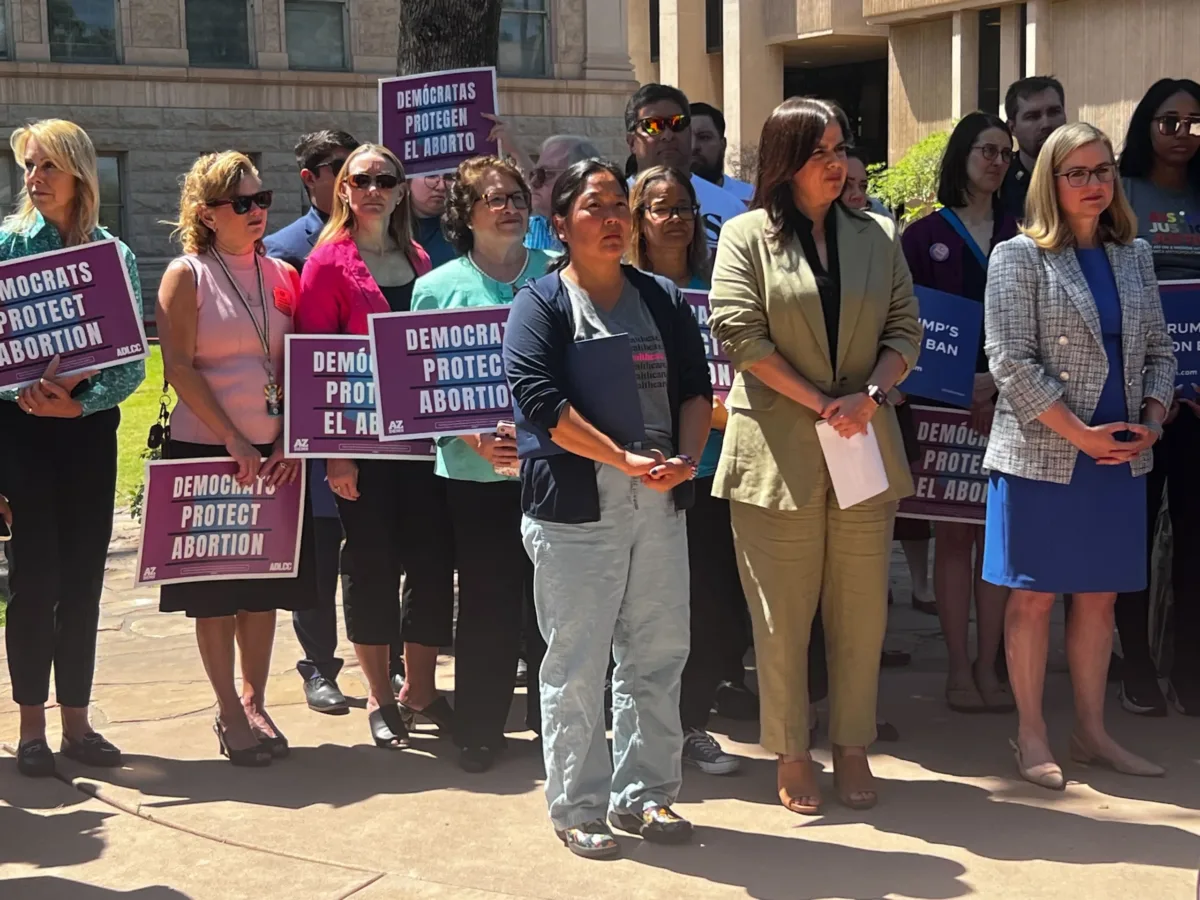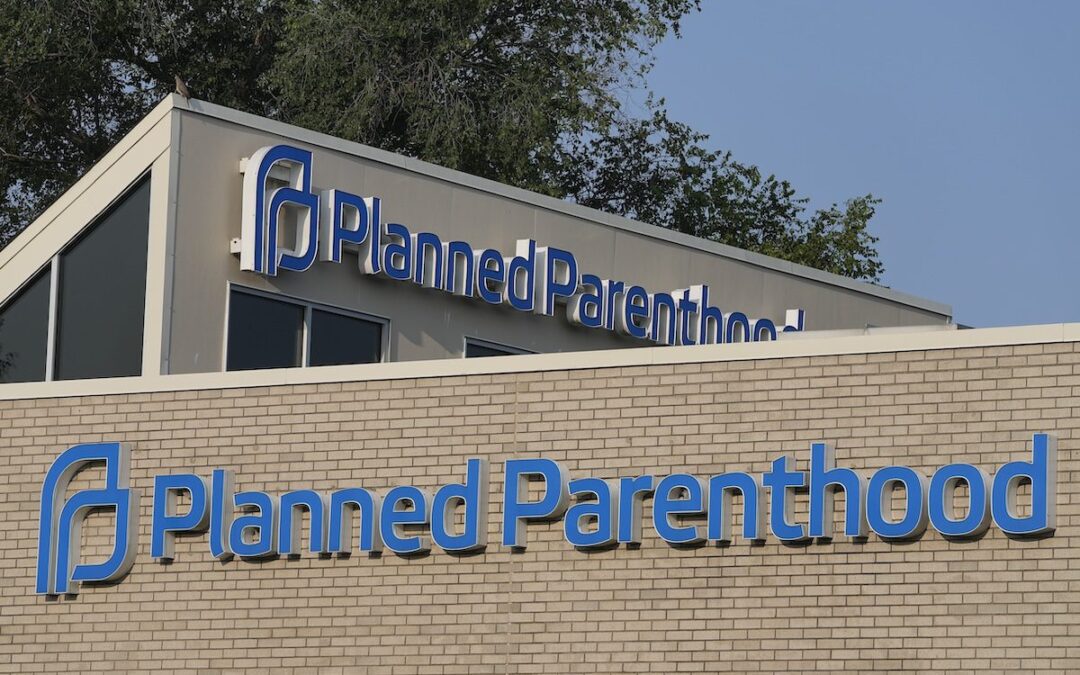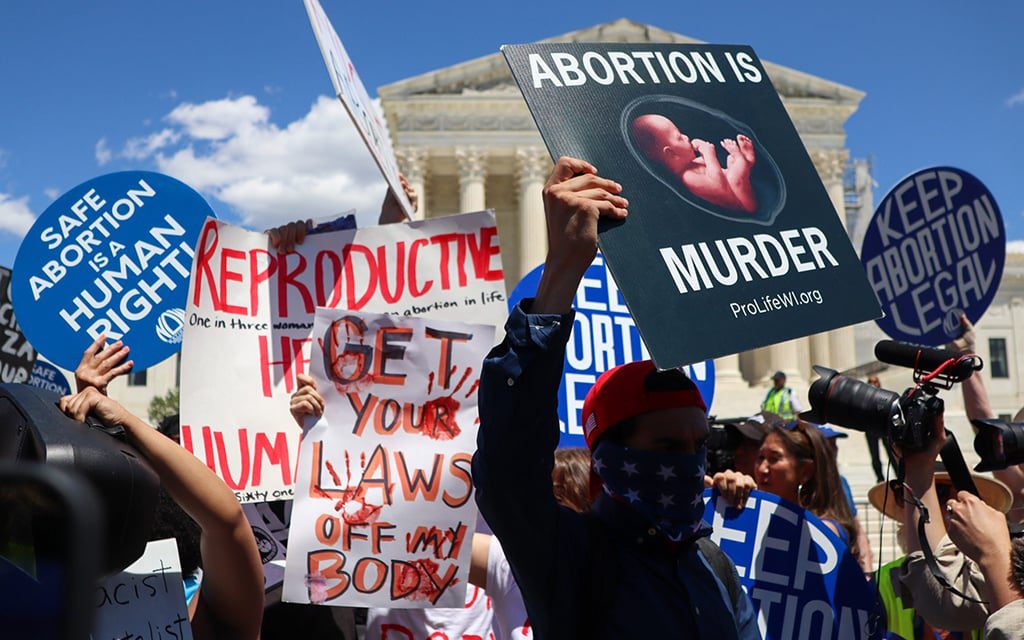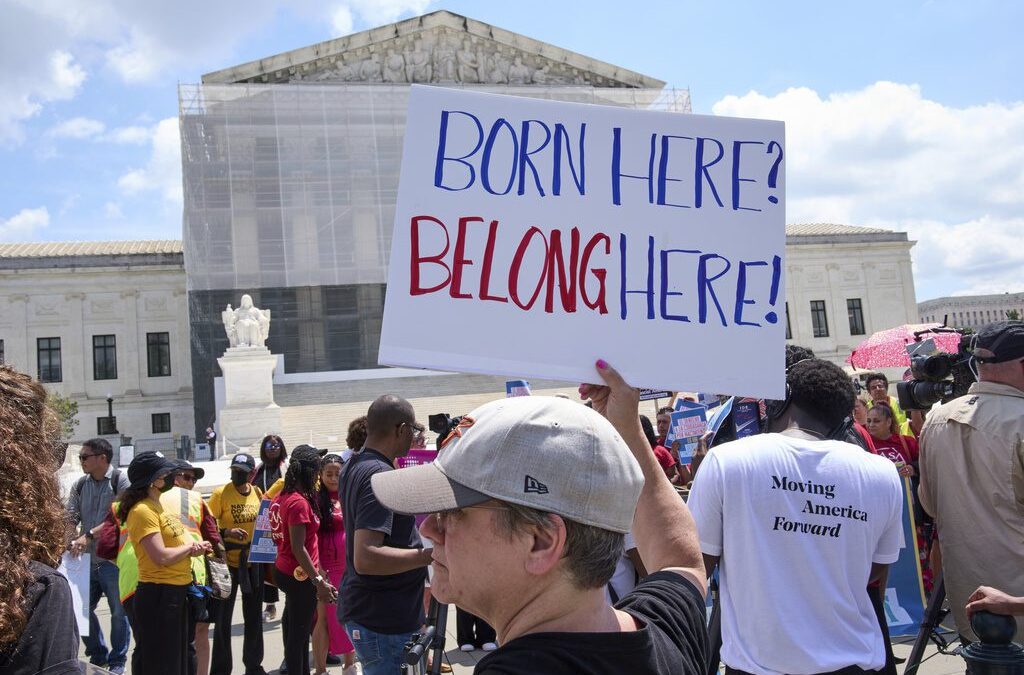
(Left to right) Dr. Atsuko Koyama, Arizona Democrats Chair Yolanda Bejarano, and Phoenix Mayor Kate Gallego stand at a press conference outside the Arizona Capitol on April 9, 2024. (Photo by Robert Gundran)
Arizona voters approved Prop 139, which amended the state constitution to protect the right to an abortion up to the point of fetal viability.
Eight months ago, physicians at Camelback Family Planning in Phoenix weren’t sure if they’d be able to provide abortion care. Today, they’re feeling hopeful about the future of reproductive rights in Arizona.
In April, the Arizona Supreme Court ruled that a Civil War-era abortion ban was the law of the land. That law, which was enacted 48 years before Arizona became a state, meant abortion was almost entirely illegal in the state.
On Election Day this year, voters affirmed the constitutional right to have an abortion in Arizona by passing Proposition 139 by a massive margin—over 61% of the vote.
Dr. Atsuko Koyama, a physician at Camelback Family Planning, expressed how she felt when it was clear Prop 139 was going to pass.
“[I felt] relief and hope,” Koyama said. “Being able to provide services the way we used to provide prior to Dobbs is hopeful, despite the fact that we’re looking at potential federal restrictions.”
The 2022 Dobbs v. Jackson decision by the US Supreme Court reversed Roe v. Wade, leaving abortion laws up to elected officials in state governments. In many states like Arizona, long-outdated abortion laws were triggered when Roe fell, leaving health-care providers in the dark about how to care for their patients. Republican leaders then quickly passed laws that enforced those antiquated abortion bans.
But Arizonans organized in support of a ballot measure, giving voters in the state the final say through Prop 139.
“It’s obvious that the people of Arizona support access to abortion, so that’s exciting,” Koyama said.
RELATED: An Arizona physician counts down the days until the 1864 abortion ban takes effect
Prop 139 created an amendment to the state constitution, protecting the right to an abortion up to the point of fetal viability, which is when a fetus can survive outside the uterus, around 24 weeks of gestation. The amendment also protects medical providers and allows them to perform abortions after fetal viability if it is determined that the procedure is needed to protect the health of the patient.
The passage of Prop 139 didn’t immediately remove Arizona’s 15-week ban, and groups recently brought a lawsuit to remove the ban from the books. Arizona Attorney General Kris Mayes has said the state would pause enforcing the 15-week ban until the lawsuit has been decided.
Camelback Family Planning is already offering abortions up to the point of fetal viability, confident that the lawsuit is an open-and-shut case where a constitutional amendment clearly takes priority over state statute.
Koyama said that although there’s a worry that Republicans locally and nationally may try to curtail access to abortion, it’s comforting to know that Arizonans supported the measure and have politicians in positions of power to protect health-care access.
“I think it’s important for us to take the good and the win when we have it, right?” Koyama said.
“We’ve heard from the Attorney General Kris Mayes, and we’ve heard from Gov. Katie Hobbs,” she said. “I want to focus on who we have that supports abortion access right now. So I think it’s important for all of us to not live in fear all the time. I can be hopeful.”
Outside of the 15-week ban and the former Civil War-era ban, Arizona still has a variety of abortion restrictions.
People who want to get an abortion are required to wait 24 hours after meeting with a physician before they can have one, which makes it more difficult and expensive for rural Arizonans who have to travel to Maricopa County or Tucson.
“I think all these restrictions [aren’t helpful], whether it’s the 24-hour law or the language where you have to ask about listening to fetal heartbeats,” Koyama said.
She said it’s most important for physicians to provide care that is unbiased and scientifically sound.
“I don’t think the [24-hour law] is fair to patients,” Koyama said.
In Arizona, it’s also illegal to get abortion medication via telehealth. Striking down or removing laws prohibiting that, as many states have already done, would be another avenue to expand access.
“If we can do medication abortion through telemedicine that would expand access because right now you’re only talking about brick and mortar,” Koyama said. “You don’t need that as long as someone has internet access.”
It’s early, but Arizona statewide elections for governor, attorney general, secretary of state, and the entire Legislature will happen in 2026. If voters want to expand access, they’ll have to vote against anti-abortion politicians that currently make up the majority of the state Senate and state House of Representatives.
READ MORE: Arizona grand jury indicts duo for $100,000 school voucher fraud
Support Our Cause
Thank you for taking the time to read our work. Before you go, we hope you'll consider supporting our values-driven journalism, which has always strived to make clear what's really at stake for Arizonans and our future.
Since day one, our goal here at The Copper Courier has always been to empower people across the state with fact-based news and information. We believe that when people are armed with knowledge about what's happening in their local, state, and federal governments—including who is working on their behalf and who is actively trying to block efforts aimed at improving the daily lives of Arizona families—they will be inspired to become civically engaged.


‘Crisis pregnancy centers’ in Arizona are deceiving pregnant women
When someone goes to the doctor’s office to get a diagnosis or treatment, they expect to get accurate and expert information from a licensed...

Planned Parenthood suspends Medicaid services, citing ‘Big Beautiful Bill’ restrictions
Planned Parenthood Arizona (PPAZ) announced on Sept. 29 that as of Oct. 1 it can’t accept patients who rely on the Arizona Health Care Cost...

Travel time rose post-Dobbs in states limiting abortion, with AZ seeing surge from Texas
WASHINGTON – In 14 states that made abortion all but impossible to obtain after the Supreme Court overturned Roe v. Wade, women seeking to end a...

Supreme Court limits nationwide injunctions, but fate of Trump birthright citizenship order unclear
WASHINGTON (AP) — A divided Supreme Court on Friday ruled that individual judges lack the authority to grant nationwide injunctions, but the...





